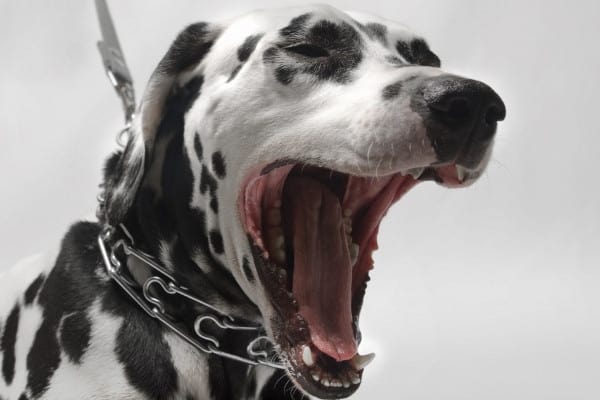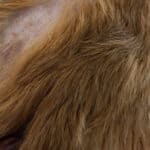
Seeing black spots inside your dog’s mouth? Not to worry, we’ve done all the research so that you can make an informed decision about your four-legged-friend’s health.
Why does my dog have black spots on his gums? Black spots in your dog’s mouth is usually just a result of high pigmentation in the mouth that leads to black spots in the gums and is not a cause for concern. Black spots may also be a sign of dental diseases or oral cancer, although this is generally not the case.
In this article, we’ll discuss all that you need to know about the spots in your dog’s mouth that may be worrying you.
Black Spots on Dog’s Gums – Possible Causes
According to PetDT, there are various reasons why your dog may have black spots on their gums, including normal pigmentation and their lineage.
Other, more worrisome reasons may include dental disease or oral cancer, but don’t get ahead of yourself with worry!
Below, we’ll discuss how black spots can just be due to normal pigmentation and how these spots might be due to a dog’s lineage.
In the worst case scenario, these spots may also be due to dental diseases. These diseases may include periodontal disease, gingivitis, cyanosis, or oral cancer.
Here is everything you need to know about black spots on your dog’s gums.
Normal Pigmentation
Think of pigmentation in dogs as you would with freckles or birthmarks on humans: some of us are just simply born with it!
Just as with people, pigmentation is normal. In dogs, spots in their mouths are usually a result of heavy pigmentation in their mucus membranes.
These spots are flat and are also referred to as microscopic granules of melanin found in your dog’s mouth.
Keep in mind that these pigmented spots are always flat and never raised. They feel like the rest of the surface in your dog’s mouth and pose no threat whatsoever.
If a spot in your pooch’s mouth is raised, it’s best to take them for a check up with their vet. This is especially the case if your dog doesn’t usually have spots in their mouth.
Lineage
The above-mentioned pigmentation is usually as a result of genetics, according to Doggy Saurus. Some dog breeds are just simply more predisposed to having pigment spots in their mouth.
Think about it, humans aren’t really much different. If you have red hair and freckles, it’s likely that someone in your family also has these features.
Similar to freckles with humans, inherited pigmentation in dogs is not something to be worried about.
However, where your beloved dogs are concerned, it is always best to play it safe and take them to the vet if you are unsure about the appearance of black spots in the mouth.

Dental Disease
Where your dog is concerned, it is always best to play it safe. Black spots may also be a sign of unwanted dental disease commonly found in dogs.
Below are possible dental diseases that may be related to black gums.
Periodontal Disease
Black spots along your dog’s gum line may be space between the teeth roots that have been exposed to gum disease. Gums may also darken if they aren’t well irrigated.
Gingivitis
Gingivitis is another form of gum disease that causes inflammation and swelling in the gums. Symptoms of gingivitis may include a black line around the dog’s gums near the teeth.
Cyanosis
If you see a bluish to dark tinge on your dog’s gums, this may be an indication of cyanosis. This is when not enough oxygen is moving toward the mucus membrane of your dog’s mouth.
Cyanosis is typically a sign of an underlying problem, and you should have the dog seen by a veterinarian as soon as possible.
Oral Cancer
If you see abnormal growths in your dog’s mouth paired with black gums, this may be a sign of oral cancer.
These growths can cause your dog to develop hypoxia, which deprives parts of the body from oxygen, leading to black gums.
If you suspect that your dog has cancer, it is always best to take your dog to the vet right away.
When To Be Concerned About Black Spots on Dog’s Gums
However, if your dog suddenly has spots on their tongue and they never had them before, it’s best to take him to the vet.
If these spots are raised or discolored, it is highly recommended that you take your dog to the vet for a checkup.
Breeds That Commonly Have Black Coloration Within the Mouth

The list of dogs known to have pigmentation is a long one, but here are a few of the most well-known domesticated breeds:
- Chow Chow
- Dalmatian
- Shar Pei
- Australian Shepherd
- Newfoundland
- Irish Settler
- Pitbull breeds
- Mastiff breeds
If your dog has black spots in their mouth and you don’t see his breed on the list, it is still likely down to lineage.
You especially don’t need to worry if your furry friend has had the spots since they were a pup. This is likely a sign that they inherited the pigmentation.
Related Questions:
Here are other spot-related questions that you might find interesting.
Why Does My Dog Have Black Spots on His Tongue?
According to Prairie Path, spots on the tongue are just as common as spots on the gums. These spots may simply be as a result of pigmentation.
Similar to birthmarks or freckles on humans, some dogs are just more predisposed to having these black spots. Generally, it is not something to worry about.
If your dog has had spots on their tongue since they were a pup, it is likely due to inherited pigmentation.
However, if your dog suddenly has spots on their tongue (and they never had them before) it’s best to take them to the vet.
What Are the Black Spots on My Dog’s Lips?
According to the American Kennel Club (AKC), pigmentation in your dog’s mouth is not limited to the gums and tongue. These black spots may also occur on your dog’s lips.
The AKC agrees that oral pigmentation in dogs is nothing to be worried about. However, if these spots are raised or discolored, it is highly recommended that you take your dog to the vet for a checkup.
Conclusion
In conclusion, black spots on your dog’s gums may be more common than you think, and are likely the result of pigmentation.
Pigmentation is as normal in dogs as freckles or birthmarks are in humans and should not be a cause of concern.
However, in this article we also discussed how black spots may be a sign of dental disease or oral cancer.
If you are unsure about the spots in your dog’s mouth, it is better to play it on the safe side.
Take your dog for a checkup with the vet, who will be able to confirm whether spots in your dog’s mouth are a cause for concern.
Sources:
https://www.akc.org/expert-advice/health/black-spots-on-a-dogs-tongue/
https://midogguide.com/maintenance-and-care/what-do-black-spots-in-a-dogs-mouth-mean.html
https://pethelpful.com/dogs/Dogs-with-Black-in-Their-Mouth




